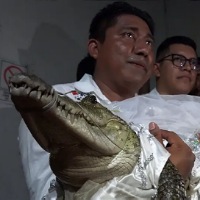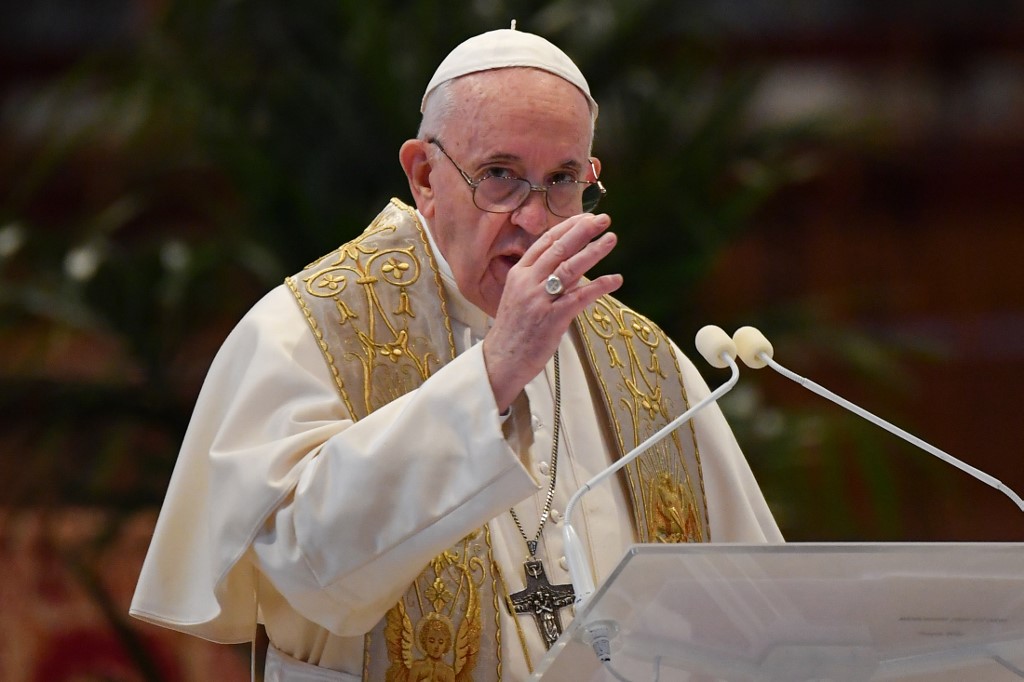International News
Mexican Mayor Marries Female Reptile

In a unique and traditional ceremony, Victor Hugo Sosa, the mayor of San Pedro Huamelula, a small town in southern Mexico inhabited by the Indigenous Chontal community, recently celebrated a special union.
Embracing his community’s ancestral practices, Mayor Sosa entered into a sacred matrimony with Alicia Adriana, a female reptile, as part of a ritual believed to bring prosperity and well-being to his people.
The reptile, Alicia Adriana is a caiman, a species resembling an alligator that thrives in the marshlands of Mexico and Central America.
In the ceremony deeply rooted in local lore, Sosa pledged his loyalty and devotion to “the princess girl,”
Sosa said during the ritual “I accept responsibility because we love each other. That is what is important. You can’t have a marriage without love… I yield to marriage with the princess girl.”
Prior to the wedding ceremony, a unique tradition takes place where the reptile, adorned in vibrant attire, is taken from house to house.
Residents of the town have the opportunity to hold the alligator in their arms and engage in joyful dances together.
The alligator’s ensemble includes a green skirt, a beautifully hand-embroidered tunic bursting with colors, and an eye-catching headdress embellished with ribbons and sequins.
The creature’s snout is bound shut to avoid any pre-marital mishaps. Later, she is put in a white bride’s costume and taken to town hall for the blessed event.
As part of the ritual, Joel Vasquez, a local fisherman, tosses his net and intones the town’s hopes that the marriage may bring “good fishing, so that there is prosperity, equilibrium and ways to live in peace.”
After the wedding, the mayor dances with his bride to the sounds of traditional music.
Sosa told AFP “We are happy because we celebrate the union of two cultures. People are content,”
For the past 230 years, a unique and time-honored tradition has been observed in this region—a marriage between a man and a female caiman.
This distinctive ceremony serves as a commemoration of the day when two Indigenous groups reached a momentous peace agreement, signified by a union through marriage.
In accordance with a rich tradition that dates back many years, the reconciliation of two Indigenous groups is commemorated through a symbolic marriage ceremony.
Representing the Chontal community, the mayor assumes the role of a Chontal king, while the female alligator represents the princess girl from the Huave Indigenous group.
The Huave people reside in the coastal regions of Oaxaca, not far from the inland town where this ceremony takes place.
The wedding allows the sides to “link with what is the emblem of Mother Earth, asking the all-powerful for rain, the germination of the seed, all those things that are peace and harmony for the Chontal man,” explains Jaime Zarate, chronicler of San Pedro Huamelula.
International News
JUST IN: Vatican Discloses Cause Of Pope Francis’ Death

The Vatican has disclosed that Pope Francis died of a stroke, which caused a coma and irreversible heart failure, according to his official death certificate released on Monday.
The 88-year-old pontiff passed away on Monday morning, nearly a month after being discharged from hospital following treatment for double pneumonia.
In the statement released by the Holy See Press Office, the cause of death was identified as “a stroke, followed by coma and irreversible cardiocirculatory collapse.”
READ MORE: JUST IN: Vatican Mourns As Pope Francis Passes Away At 88
The certification was issued by Dr. Andrea Arcangeli, Director of the Directorate of Health and Hygiene of the Vatican City State.
The medical report also detailed the Pope’s history of health challenges, including “acute respiratory failure caused by multimicrobial bilateral pneumonia, multiple bronchiectases, high blood pressure, and Type II diabetes.”
His death was confirmed through electrocardiographic thanatography.
“I hereby declare,” wrote Dr. Arcangeli, “that the causes of death, to the best of my knowledge and judgment, are as stated above.”
Pope Francis, born Jorge Mario Bergoglio, became the 266th leader of the Roman Catholic Church in 2013 and was widely recognized for his efforts to modernize Church doctrine and promote global social justice.
International News
JUST IN: Vatican Mourns As Pope Francis Passes Away At 88
Pope Francis, the 266th pope of the Roman Catholic Church, has died at the age of 88, the Vatican announced on Monday.
His passing came just a day after he made an emotional appearance before thousands of faithful gathered at Saint Peter’s Square for Easter Sunday celebrations.
“It is with deep sorrow that I must announce the death of our Holy Father Francis,” Cardinal Kevin Farrell said in an official statement shared via the Vatican’s Telegram channel.
READ ALSO: Pope Francis To Return To Vatican After Month-Long Treatment
“This morning at 7:35 am (0535 GMT) the Bishop of Rome, Francis, returned to the home of the Father. His entire life was dedicated to the service of the Lord and His Church.”
The pontiff’s final public appearance, marked by visible frailty, came as a surprise to many, as he had only recently been discharged from the hospital following a prolonged battle with pneumonia. Francis had endured two life-threatening health scares earlier this year and spent 38 days hospitalized before being released on March 23.
Despite his condition, the pope greeted crowds on Easter Sunday with a heartfelt “Happy Easter” and delivered his traditional “Urbi et Orbi” blessing, using the occasion to call for global peace, freedom of thought, and tolerance.
Pope Francis, born Jorge Mario Bergoglio in Buenos Aires, Argentina, was the first pope from the Americas and the first Jesuit to assume the papacy.
His decade-long leadership was marked by a focus on compassion, humility, social justice, and outreach to marginalized communities.
International News
Gabonese Voters Head To Polls In First Presidential Election Since 2023 Coup
Gabonese citizens lined up at polling stations on Saturday to cast their votes in a landmark presidential election, the first since the military ousted the Bongo dynasty in a coup last August.
Eight candidates are vying for the top job, but all signs point to junta leader General Brice Oligui Nguema — the man behind the August 30, 2023, coup — emerging as the frontrunner.
Oligui, who toppled Ali Bongo and ended 55 years of family rule widely criticized for corruption and economic mismanagement, has dominated opinion polls in the run-up to the vote.
In the capital, Libreville, snaking queues formed outside polling stations as voters turned out early.
READ MORE: Gabon Extends Investment Offer To Dangote Amid Nigerian Attacks
Among them was 30-year-old Aurele Ossantanga Mouila, who cast his ballot for the first time after finishing a night shift at a casino.
“I did not have confidence in the earlier regime,” Mouila told reporters, echoing the sentiments of many young voters hoping for change in the oil-rich central African nation.
Oligui, who served as transitional president while civilians drafted a new constitution, swapped his military uniform for campaign attire as he seeks a seven-year mandate.
He faces seven challengers, including his main rival, former Prime Minister Alain-Claude Bilie By Nze, a longtime insider under Ali Bongo who now brands himself as the face of a “complete rupture” from the past.
Despite Oligui’s promises of reform, critics question his commitment to breaking with the old system, noting his deep ties to the Bongo era.
His campaign slogan, “C’BON” — a clever wordplay blending his initials with the French phrase for “It’s good” — has been plastered across Libreville, while rival candidates struggle for visibility.
As roughly 920,000 registered voters cast their ballots, the election is taking place against a backdrop of pressing national issues.
High unemployment, failing infrastructure, regular power outages, and soaring government debt — projected to reach 80 percent of GDP this year — have fueled public frustration.
Analysts, like political observer Neyer Kenga, say the vote represents a critical test for Gabon’s return to civilian rule and constitutional order.
“Today all Gabonese are firmly in favour of a democratic game that is played within the rules,” Kenga noted, adding that the outcome remains uncertain in a nation scarred by post-election violence in 2009 and 2016, as well as last year’s coup.
The interior ministry has pledged a “transparent ballot” and results are expected by Monday. Meanwhile, Oligui remains confident of victory.
“The builder is here, the special candidate, the one you called,” he declared at his final rally, as music and dancing filled the streets of Libreville.














